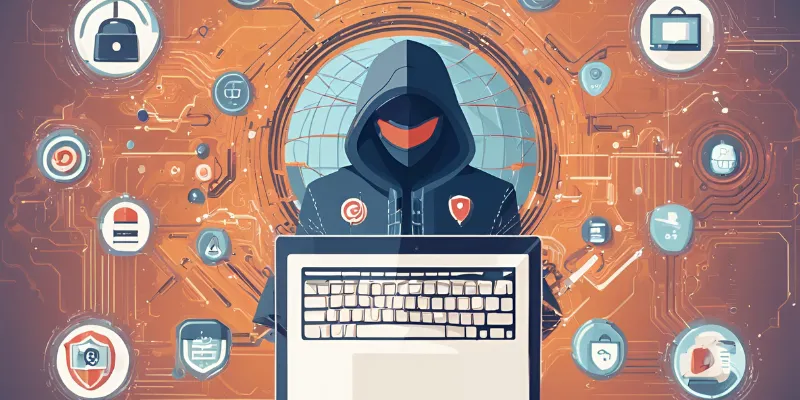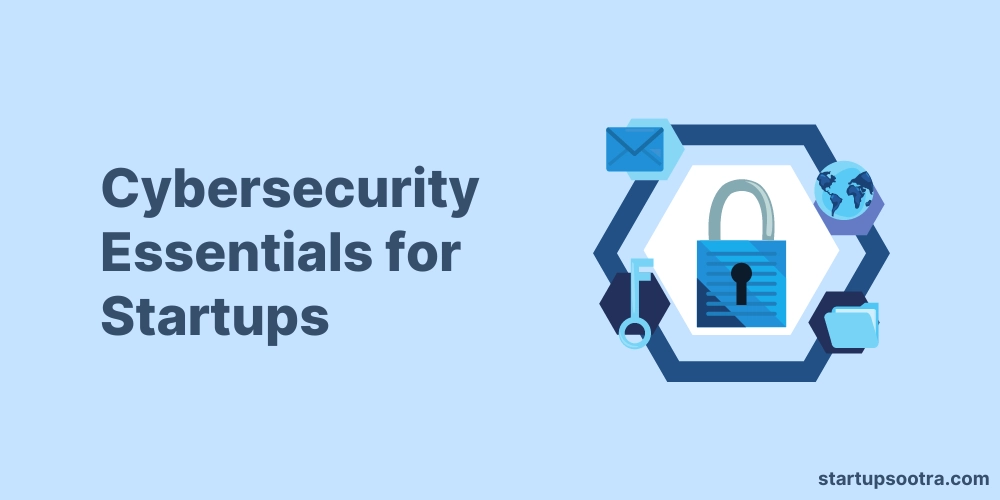In today’s tech world, cybersecurity is a top priority for startups, not just a tech need. A recent report predicts global cybercrime costs to hit $10.5 trillion yearly by 2025. For new business owners, safeguarding against cyber threats is vital. In this blog post, I have listed out the top 10 cybersecurity tips for startups to protect your startups.
What is cybersecurity?
Cybersecurity is protecting computer systems, networks, and sensitive data from cyber threats like hacking, unauthorized access, and data breaches. It employs robust security measures such as firewalls, encryption techniques, and multi-factor authentication to safeguard critical information assets’ confidentiality, integrity, and availability.
The Importance of Cybersecurity for Startups
Being a startup means having limited resources where every asset is important. Cybersecurity goes beyond data protection. It is vital to safeguard the future of your company. A sole cyberattack can result in financial losses, private data losses, harm to reputation, and disruptions in operations, which can be extremely damaging for your startup.
10 Best Cybersecurity Tips for Startups to Follow

Here are the 10 best cybersecurity tips for startups to follow:
1. Implement Strong Passwords and Multi-Factor Authentication
Passwords serve as the primary line of defense against cyber threats, highlighting the importance of using strong and complex passwords. Simple passwords are susceptible to cyber attacks, emphasizing the need for creating intricate combinations that include a mix of letters, numbers, and symbols.
Moreover, implementing multi-factor authentication (MFA) can significantly enhance security measures by requiring users to provide multiple verification factors for access. This additional layer of protection helps reduce the risk of unauthorized entry and fortifies cybersecurity defenses. Individuals and organizations alike must prioritize password security and adopt best practices to safeguard sensitive information from potential data breaches and malicious activities.
2. Provide Comprehensive Cybersecurity Training for Employees
Employees are a crucial asset, but they can also pose cybersecurity risks if not properly trained. Regular training sessions are vital to help employees recognize and combat phishing attempts, create strong passwords, and follow data protection best practices. This fosters a secure work environment.
By investing in employee education and shared responsibility for information security, businesses can significantly enhance their cybersecurity posture and reduce the risk of data breaches or unauthorized access.
3. Prioritize Regular Security Audits
Regular security audits play a crucial role in fortifying an organization’s cybersecurity posture by proactively identifying and mitigating vulnerabilities before malicious actors can exploit them. These comprehensive assessments examine every facet of the IT infrastructure, scrutinizing hardware, software, networks, and security protocols implemented across the digital landscape.
By conducting a thorough assessment, security audits uncover potential vulnerabilities, whether they arise from out-of-date software, incorrect configurations, or deficiencies in security practices. This invaluable insight enables organizations to take corrective action, implement stronger countermeasures, and strengthen their defenses against emerging threats.
Moreover, regular security audits ensure compliance with industry standards and regulatory requirements, mitigating the risk of hefty fines and reputational damage resulting from non-compliance.
4. Monitor Network Activity Continuously
Continuous network monitoring is essential for robust cybersecurity. It allows organizations to immediately detect suspicious activities that could compromise their digital assets. By analyzing network traffic with good tools, organizations can identify deviations from normal patterns that may indicate a cyber threat.
This proactive approach allows organizations to quickly respond to suspicious behavior, whether from hackers or internal errors before major damage occurs. Early detection mitigates attacks through timely countermeasures. Continuous monitoring not only improves prompt threat response but also deters attackers from targeting constantly surveilled systems.
5. Deploy a Robust Firewall
It is one of the key cybersecurity tips for startups. A firewall is a critical defense against external threats, acting as a barrier that inspects incoming and outgoing network traffic based on security rules. Properly configuring and regularly updating your firewall is essential to prevent unauthorized access attempts and malicious cyber attacks.
Firewalls also monitor and control internet connections, preventing potential breaches. Reviewing firewall logs helps identify attempted breaches and fine-tune settings for enhanced protection. Implementing intrusion detection/prevention systems alongside firewalls adds another layer of security to identify and stop suspicious activities in real time.
6. Limit Access to Sensitive Data
Role-based access control (RBAC) is a must-have security measure. It limits data access based on an employee’s role. Not every employee needs full data access. This reduces insider threats and unauthorized breaches. With role-based access control, access is predetermined for each role. A marketing associate may only see marketing data. An IT admin has broader technical access.
This granular control enhances security and confidentiality. It also helps meet compliance regulations like GDPR or HIPAA. It also streamlines the onboarding and offboarding processes for employees, as their access rights are automatically adjusted based on their role within the organization.
7. Ensure Regular Data Backups
Data loss can cripple businesses and individuals. Causes include cyberattacks, hardware issues, and human errors. To mitigate the risks associated with data loss, implementing a robust backup strategy is crucial. Regularly backing up your data not only safeguards against potential disasters but also ensures that you can swiftly resume operations with minimal downtime in case of an unforeseen event.
Automated backup solutions offer a convenient way to streamline the backup process and reduce the likelihood of oversight. Furthermore, storing backups in multiple secure locations adds an extra layer of resilience to your data management strategy. It’s also essential to conduct periodic tests of your backup systems to verify their integrity and effectiveness. Regularly reviewing and updating your backup procedures in response to evolving threats and operational changes will help ensure that your data remains secure and recoverable when needed most.
8. Keep Systems and Software Updated
I know hackers love to take advantage of old software that has weaknesses. That’s how they can break into your systems and steal your data. But you can protect yourself by regularly updating the operating systems, apps, and security programs on all your devices. These updates fix known issues and make your systems more secure. I recommend turning on automatic updates so you don’t have to worry about doing it manually. This way, your devices always have the latest security without you lifting a finger.
Staying on top of your software updates is crucial because it significantly lowers the risk of cyber attacks. By keeping everything updated, you make it much harder for hackers to exploit vulnerabilities and gain access to your digital life. It’s like putting a really strong lock on your door – the bad guys will have a tough time breaking in.
9. Secure Your Website Thoroughly
Your website is the first thing customers see, so keep it safe. I recommend using HTTPS to scramble data between your site and users. Do routine checks to find any website weaknesses. Use web firewalls and secure coding practices to prevent common hacker strikes like SQL injection and cross-site scripting attacks.
Stay on top of the latest website security trends too. Regularly update your site’s software, plugins, and other add-ons – old versions have holes hackers can exploit. Also, teach your team good cybersecurity habits. Protecting your website earns customer trust and prevents reputation damage if something goes wrong. You’ll sleep better at night knowing your online home is a fortress.
10. Consult a Professional Cybersecurity Company
I get it, cybersecurity for startups can feel like a maze, always changing. But don’t worry, I’ve got you covered. You should consider teaming up with cybersecurity experts. These pros know their stuff – they can assess your current security, set up robust defenses, and handle any incidents swiftly. They’ll identify vulnerabilities in your systems and apps, and then recommend custom solutions to fix those holes. Plus, they ensure you comply with important regulations and standards.
Cybersecurity firms don’t just strengthen your defenses against cyber threats, they build trust with your clients and partners by showing you’re serious about data protection and keeping operations running smoothly. The experts will train your team on cybersecurity best practices, so you’re all ready to tackle new threats head-on. By partnering with these cybersecurity gurus, you’ll stay ahead of the curve on the latest security trends and tech.
Wrapping Up
In today’s era, cybersecurity is crucial for startups wanting to grow sustainably. Following these top 10 cybersecurity tips for startups can lower cyber risks and protect your business. Be proactive, train your team, and consult experts when necessary. Your startup’s success hinges on today’s security efforts.




